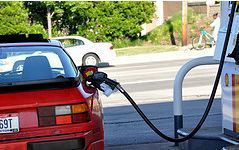Avoid High Octane Gas To Save Money At The Pump
Those higher-octane gas choices sit there at the gas station, looking down their noses at you and daring you to throw down the extra cash in order to buy the very best for your car. But unless you drive a high-end vehicle with a manual that specifically recommends the higher-octane fuel, you’re most likely best off with regular unleaded.
LiveCheap tells you to ignore the octane rating, least of all because you probably don’t understand what the number represents:
Simply put, the octane rating is a measure of the gasoline’s resistance to combustion. Higher octane gas requires more energy for it to explode. Higher octane gas also has lower levels of “knocking” which is what happens when gas explodes too quickly in the combustion process. If you took the pure hydrocarbon octane and measured it, it would get a rating of 100…. a perfect score. Gasoline is a mixture of hydrocarbons and hence has a lower than 100 score. The lower the score, the easier it is to combust, the earlier in the combustion cycle it explodes, and the more prone it is to knocking. Now you know why if your car knocks (which is a problem that can lead to engine damage), people will recommend a higher octane gasoline.
The bottom line is that most cars are designed for regular 87 octane gas, and your car isn’t classy enough to know whether you’re feeding it ground chuck or filet mignon.
Does Buying High Octane Gas Save You Money? [LiveCheap]
Want more consumer news? Visit our parent organization, Consumer Reports, for the latest on scams, recalls, and other consumer issues.


